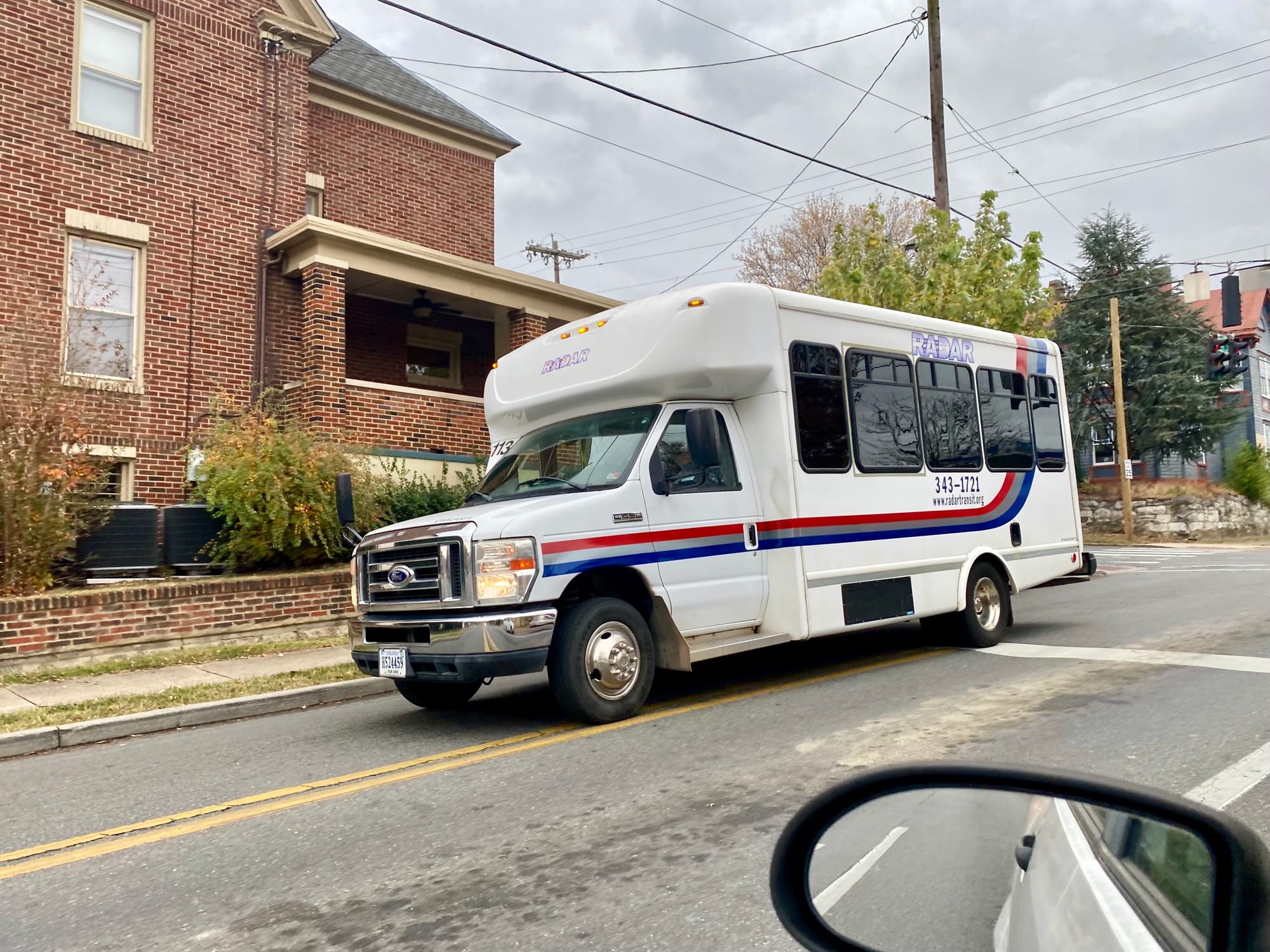Roanoke Bus System To Launch On-Demand Sunday, Late Night Service in 'Microtransit' Pilot
The two-year pilot program from Valley Metro fulfills a promise from city leaders who earmarked $3 million in federal pandemic relief funds to improve public transit.

Roanoke’s bus system next month is launching on-demand service for riders on Sundays and in the evening hours the other days of the week.
The two-year pilot program from Valley Metro fulfills a promise from city leaders who earmarked $3 million in federal pandemic relief funds to improve public transit.
Service on Sunday is expected to run from 9 a.m. to 6 p.m. and Monday through Saturday extend from 8:45 p.m. to 12:45 a.m., according to a copy of a contract with the nonprofit RADAR, which will run the pilot.
Residents who want to use the service will have to call 24 hours in advance to schedule a ride, similar to how RADAR’s trips for people with disabilities work.
Eight passenger vans will make up the fleet initially, with at least one assigned to Salem, Vinton and each of Roanoke City’s four quadrants, Valley Metro’s contract with RADAR says.
Cash fares will be $1.75 per ride, according to the contract. Each van holds about a dozen people.
“The anticipation is that it’s going to be fairly busy,” Kevin Price, general manager of Valley Metro, said in an interview. “This has been such a large request, or consistent request, over the last couple of decades, I would say. So the demand is built up.”
Bus riders have long identified more frequent trips, Sunday service and late-night rides as top priorities, according to bus system master plans.
Laura Hartman, a leader of Bus Riders of Roanoke Advocacy Group, said bus riders look forward to using the service to shop, work and attend religious services.
“BRRAG members are very excited about the new microtransit system which was promised in April of 2022 and may finally come to fruition in 2024!” she said in an email.
Officials are still finalizing when in January the service will launch, Price said.
Greater Roanoke Transit Company, the formal name of Valley Metro, has agreed to pay RADAR no more than $900,000 for the first year of service and $931,500 for a second year, according to the contract.
Rather than using traditional buses on fixed routes, Valley Metro is taking part in a trend called “microtransit,” whereby passengers request a specific trip in advance.
Service will be refined as people begin using it, Price said, noting that trips will likely start as door-to-door service but that an informal route could develop.
“We saw this new venture as a natural extension of our business with [Valley Metro] already.” Nathan Sanford, executive director of RADAR, said. “I would anticipate low ridership to begin with and then it will ramp up as folks get a little bit more familiar with where it covers and where it goes and the hours that it operates.”
Experimenting with the on-demand trips — rather than extending traditional Valley Metro service — may be more economical, according to Price.
“The idea is to let demand drive the service,” he said, “versus putting out a fixed route bus that just runs empty for however many trips it runs.”
“With this type of service, the passengers will kind of drive how the service looks,” Price added. “And if over time we notice that, Okay, we have a route basically developing, then we'll move towards more of what people are used to, a fixed route service. But we don't want to put that out there first, because you may waste a lot of resources doing that.”
Hartman said Roanoke hasn’t had Sunday or late evening service since the 1970s, when low ridership prompted cutbacks.
“We're excited to demonstrate to Valley Metro that there is demand for transit in the later evening and on Sundays,’ she said in an email. “This has explicitly been described as a 'pilot program,' so if we successfully demonstrate demand, Valley Metro might institute full bus service during these times.”
Overall, Valley Metro ridership has plummeted since the pandemic hit in March 2020. These days, ridership is down about 40 percent compared to pre-pandemic levels, Price told Greater Roanoke Transit Company leaders in September.
City officials have said if the pilot is successful, the city could convince agencies such as the Virginia Department of Rail and Public Transportation (DRPT) to help fund its continuation.
Last year, Valley Metro missed out on securing state funding that could have helped pay for the pilot itself.
“They had applied last year under DRPT's Demo grant program for the service but lacked sufficient detail to demonstrate readiness for the service, so it did not receive funding at that time,” Amy Friedenberger, an agency spokeswoman, wrote in an email.
Valley Metro could use data from the pilot to inform extending regular service, or on a more detailed demonstration grant application, according to Friedenberger. There are various ways to measure success.
“General performance metrics we've seen have been new and returning customers of the service, local cost per capita, and cost per revenue mile but it can be case by case on how agencies define their benchmarks,” Friedenberger wrote.
At City Council’s regular meeting Monday, resident Linda Kraige asked city leaders to consider extending bus service on Sundays. She floated the idea of starting a petition.
“I ride the buses of Valley Metro. That’s my main way of getting around these days,” she said. “I would go to church on Sunday, but I don’t have a ride there.”
Vice Mayor Joe Cobb, who serves as board president of Greater Roanoke Transit Company, told a startled Kraige that Sunday service would be starting next month.
“I didn’t know y’all had it in you,” Kraige said.
“We do,” Cobb said to audience laughter. “We do.”

